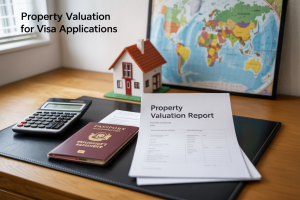Property Valuation in Visa Applications

Property Valuation for Visa Applications is a critical document that proves your financial stability when applying for a visa. This valuation helps immigration officers verify the true value of your property and supports your visa approval process. and Asset Property Valuation for Visa Applications: Complete Guide
Property Valuation for Visa Applications is a crucial process that determines the accurate market value of your property when applying for a visa. This valuation serves as proof of your financial stability and helps make your visa application more credible to immigration authorities. Without a proper property valuation, the visa approval process may face delays or complications.
Key Components of a Valid Property Valuation Report
- Description of the property including location, size, and physical condition
- Valuation methodology used
- Date of valuation
- Market analysis supporting the assessed value
- Certification and signature of the qualified valuer
Why Property Valuation Is Important for Visa Applications.

Property Valuation for Visa Applications is an important process that determines the accurate value of your property when applying for a visa. A proper property valuation for visa applications serves as proof of your financial stability during the application process. Without this property valuation for visa applications, the visa process may face delays or complications.
Who Can Conduct the Valuation
A valid property valuation must be conducted by a certified valuer or professional valuation firm. The report should comply with recognized standards, such as those set by the International Valuation Standards (IVS), and must be signed and sealed by an authorized professional.
What a Standard Valuation Report Should Include
A complete and acceptable property valuation report typically includes the following:
- Full address and legal description of the property
- Ownership details and property history
- Description of the land and buildings (size, type, usage, etc.)
- Current market trends and supporting market data
- Valuation approach/methodology (e.g., market comparison, income approach, or cost approach)
- Final assessed market value
- Date of inspection and valuation
- Certification from the valuer, including license number and credentials
Types of Valuation Methods Used
- Market Approach – Based on recent sales of similar properties in the area
- Cost Approach – Based on the current cost of rebuilding or replacing the property
- Income Approach – Typically used for income-generating properties, like rentals
Required Documentation for Property Valuations

Property Valuation for Visa Applications is a crucial step in proving your financial stability to embassies and immigration authorities. Whether for legal purposes, financial reporting, or visa processing, obtaining an accurate property valuation requires submitting specific documents. These enable the valuer to verify ownership, assess the property’s features, and determine its market value based on factual and legal information.
Below is a comprehensive list of the essential documents typically required for property valuation:
Proof of Ownership
- Title Deed (Registered Sale Deed or Khatian): This is the primary legal document that confirms ownership of the property.
- Mutation Certificate (if applicable): Proves that the property has been mutated in the name of the current owner.
Land and Property Documents
- CS/SA/RS/BS Khatians: Updated land records showing land holding history.
- Dag and Khatian Number Details: Specific land plot and registration details.
- Land Map or Mouza Map: A certified map showing the exact location and boundaries of the property.
Building/Structure Documents (if applicable)
- Building Plan/Approval Letter: Approved plan from local municipal authority.
- Construction Completion Certificate: Confirms that the building is completed as per approved plans.
- Occupancy Certificate: Certifies that the building is fit for occupancy.
Personal Identification
- National ID Card / Passport of Owner: Valid ID of the property owner(s).
- Photograph of the Owner (if required): For identification and verification.
Supporting Documents (Optional but Helpful)
- Power of Attorney (if applicable): If the valuation is being handled by an authorized representative.
- Photographs of the Property: Exterior and interior views to support the physical condition assessment.
- Conclusion

Providing complete and accurate documentation ensures a smooth and credible property valuation process. Missing or incomplete records may delay the assessment or affect the accuracy of the final valuation report. It is always advisable to consult with a certified valuer or professional valuation firm to confirm specific document requirements based on the type, purpose, and location of the property. My youtube channel link https://www.youtube.com/@bdassetvaluationadvisory


